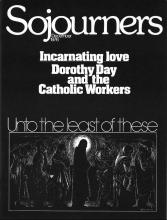My credentials as an evangelical Christian are considerable. I was raised in a Bible-believing home and church. I became a Christian at the New Wilmington Missionary Conference. I attended college at Westminster (named after the confession of faith that stands as a classic statement of evangelical doctrine) and seminary at both Gordon (now Gordon-Conwell) and Fuller. I worked for three years as a Bible instructor for Young Life Campaign.
But it wasn’t until this decade that a new stream of thought became a discernible current in my consciousness. It enriched my evangelical heritage, and, I believe, made my life a fuller expression of Christianity.
If belief in the centrality of Jesus and the authority of the Bible is at the heart of evangelical faith, then I can surely embrace that faith more warmly than ever. I know Jesus through the scripture, and scripture is meaningless to me apart from Jesus. But these dry doctrinal bones of mine were meant to live -- to be rescued from ethical impotence.
Somehow or other, whether it was my own fault or the short coming of my mentors, evangelicalism did not take me far enough into the kingdom. As I entered the '70s, my spiritual growth came from new quarters. Among these new influences was the Catholic Worker community in Los Angeles: the Ammon Hennacy House of Hospitality.
I’m not sure how it began, but my wife and I found ourselves volunteering to work one Saturday every other month at the Hospitality Kitchen on downtown LA’s Skid Row. We would arrive like aliens in a strange land at nine in the morning to prepare lunch for the mass of humanity already gathering outside the dining room door, eventually to circle into the rear alley in anticipation of bread, salad, iced tea, and rice or bean soup.
Read the Full Article

